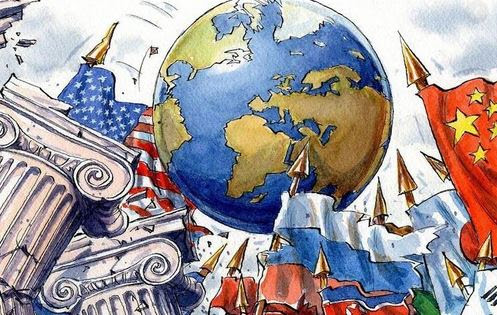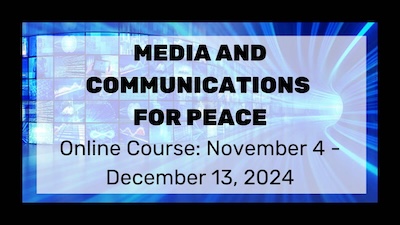By Cymry Gomery, Coordinator, Montreal for a World BEYOND War, September 21st, 2022
Statement for World Peace Day, September 21st, 2022
On September 18, 2022, Canadian Minister of National Defence Anita Anand was interrupted as she made a speech promoting Canada’s participation in the war in Ukraine. Caught by surprise when an activist raised a banner with the words, ”Trudeau, Freeland, Anand, Joly : Stop the War – Peace with Ukraine and Russia” Anand invoked the NATO mantra: ”We are defending…. we are defending the International rules-based order to protect you, and everyone in this room, and our country safe [sic] ”
What is this rule-based order that politicians seem to call on whenever they are promoting war?

Some say that the rules-based order is only a vague concept invented by G7 countries to lull us into accepting their presumptive international hegemony. Nonetheless, there is a formal international body that sets rules: the United Nations. And, when it comes to war, or the potential for war, Chapter VI of the UN Charter enjoins all countries to seek to resolve their disputes through peaceful means. If this doesn’t work, they are to refer it to the UN Security Council (UNSC), which could recommend solutions.
But what if countries are considering war and they know in advance that the UNSC would not offer a resolution in their favor, because of their self-serving motives? Take, for example, the Russia-Ukraine conflict, widely considered to be a U.S. proxy war. However, not only the U.S., but also Europe, Canada, Australia and China—just about everyone with an army–has economic interests in this war, which can be seen as a geopolitical tug-of-war for valuable commodities like lithium, gas, and wheat.
How do Canadian interests stand to benefit from the Russia-Ukraine war? It is already happening :
- Canada increased oil and gas exports in 2022 as Russia’s former customer nations sought alternative energy supplies;
- The US, EU, Canada, Australia, China, and Russia are all very interested in the Lithium deposits in Ukraine, which are among the largest in the world. The outcome of this war determines which players nab the market for this key climate-change era mineral.
- Before the Russia-Ukraine war, Russia was expected to become one of the world’s largest exporters of hydrogen, and was poised to supply hydrogen fuel to Germany. However, Russia is now faced with economic sanctions and the unwillingness of the world’s most powerful nations and largest economies to do business with Russia. All this appears very convenient for Justin Trudeau and his government, who can now scoop up hydrogen exports to the EU.
So, how can we really keep a straight face when Anand invokes the International Rules-based order? Perhaps we should call it what it really is, an attempt to hoodwink the gullible public into thinking the Canadian government is sending weapons to Ukraine for altruistic, morally sound reasons, when in fact the Liberals are just doing what they do best : looking after the ”economy” (read corporate profits) and protecting their own assets.
On this International Day of Peace, we will put on our good faith hat (not to be confused with a fools cap) and respectfully ask the Canadian government to take these measures :
- Sign the Treaty on the Prohibition of Nuclear Weapons (TPNW).
- Get Canada out of NATO, and begin negotiating with allies to dismantle NATO.
- Mandate Canadian diplomats to negotiate for peace between Russia and Ukraine.
- Divest Canadians’ retirement savings from war profiteers.
- Cancel the plan to purchase Lockheed Martin F-35 fighter jets for a lifetime cost to taxpayers of 77 billion.
- Cancel the plan to purchase killer drones for a cost of five billion.
- Cancel the plan to purchase war ships for a cost of 77 billion.
- The above cancellations of weapons of war (jets, drones and ships) will save Canadian taxpayers 159 billion, so we will no longer need a grotesquely inflated military annual budget of 22.75 billion (in 2021). We will also free up 870 million by divesting the Canada Pension Plan of arms dealers and war profiteers, plus additional millions from similar investments by the Caisse de dépot et placement du Québec, which manages Québecers’ pensions.
As the image below suggests, (Anand’s comment about our safety notwithstanding), defense spending is more indicative of a nation’s geopolitical aggressiveness than its concern for the well-being of its citizens.

The Canadian government (our representatives, in case they forgot) could use the money thus saved to implement the Green New Deal and basic income, to address climate change, to build houses, to protect Canada’s remaining wild spaces, to make national parks into Indigenous protected areas, and so much more.
We will need a nationwide consultation to decide on how best to spend this money creatively, in a life-affirming way, which is something we are not yet that experienced doing. But I am sure we will manage.
So, on this day dedicated to world peace, let’s chart a new course. Let us repudiate a foolish, nihilistic world order predicated on militarism and destruction, and vow henceforth to champion and advance a hopeful, loving world order that outlaws war.









5 Responses
Terrific. Applies to every Western country.
We as a society have never, not had war. It is in the DNA of the people.
It is naive to think that peace would occur with idol people on a guaranteed income.
The answer?? This keeps you employed for now.
Here’s a different answer: https://worldbeyondwar.org/inevitable/
Beth, War is not in our DNA. War is a feature of Western civilization, yes–but humans have been on the planet for millennia before European civilization, and during that time there were a wide variety of societal models and cultures. War was not a prominent feature of these early civilizations, which were far more complex than we are given to believe. The history of humankind is often presented in school textbooks as though it only began with the Enlightenment, and everything prior to that is vaguely brushed off as “hunter-gatherer societies.” However, thinkers like anthropologist David Graeber, and archaeologist David Wengrow (authors of The Dawn of Everything) have shown that humans are not inherently warlike.
Certainly in recent history humankind seems to have lost our way, but one way back is to look to Indigenous wisdom and to explore reconciliation and new ways of relating to one another. Also, people who are not helping to turn the wheels of the capitalist machine are not necessarily idle–they could be developing artistic talents, deepening relationships with each other and with the natural world, caring for their families and communities, and so on.
One of the lessons I learned from the WBW 201 course was less investment in talking people out of war and more on the advantages of building peace. I have friends like Beth who believe the old school DNA fallacy. As they say in the course, “You can’t talk someone out of what they’ve never been talked into”. My new strategy is thinking outside the ‘box of war’. Toward this end, I am actively committed and am grateful for WBW which I am 100% behind!